Adolescents Overcome Inequalities in the Labor Market Through Resilience

Recent research focuses on how immigrants, refugees, and their descendants fare in school and in the labor market. While most of these studies point towards a disadvantage for non-natives, less is known about how these people deal with this discrimination and become agents of their own destinies. It may therefore be interesting to look at the link between immigration background, job outcomes and resilience to get a better understanding of this process and improve outcomes.
Immigrants, refugees, and their descendants continue to face labor market disadvantages in Switzerland (Fibbi et al., 2022; Zschirnt, 2020; Zschirnt & Fibbi, 2019). This disadvantage is especially salient at the hiring stage, which affects young people entering the labor market for the first time disproportionally (Fibbi et al., 2006).
The main goal of our project was to examine how disadvantaged adolescents with a migration background gain agency and move from being objects of discrimination and inequalities, to becoming successful students or trainees of vocational education. Thus, to examine how adolescents with a migration background maneuver within social structures, we examined the relationship between students’ migration background, resilience, and career plans.
What Do We Mean by Resilience?
In a nutshell, resilience processes are positive adaptations in times of adversities (Masten, 2014). It relates to developmental paths that are positive despite having to face adversities. However, resilience is not an isolated individual characteristic but consists of three pillars. In addition to individual factors, there are social and societal ones. This means that people who support and sustain an individual are just as important as societal structures and institutions (Masten, 2014). Moreover, resilience is not an “either you have it or you do not” characteristic, but a range of forms of resilience exist (Janousch et al., 2022). Additionally, patterns of resilience vary across contexts.
A previous blog post presented findings of non-resilient, moderately resilient, resilient, and untroubled patterns in Germany and Greece. In Switzerland, however, only three patterns were found excluding the resilient one. Researching resilience therefore not only offers an analysis of individual aspects, but also of how an individual is embedded socially, and what kind of opportunities are available in each context and/or society. All three resilience pillars are key. That is, next to individual factors like grit and motivation, support from social circles and schools as well as opportunities within a society are important, particularly for adolescents searching for their apprenticeship and their first job, as we will show in this blog article.
Difficulties and Support During the Job Hunt
We studied how resilience mediates the future job and apprenticeship prospects of students in Switzerland through a survey in 2021. The participants were students at secondary schools in three German-speaking cantons, namely Aargau, Basel-Stadt, and Solothurn. In total, 258 adolescents replied concerning their plans at the end of secondary school. 43% of them defined themselves as female, 54% as male, and 3% as other. 57% were Swiss nationals and 79% were born in Switzerland. 69% identified as being Swiss and 84% declared that they understood Swiss-German very well.
The participants were asked whether they already had plans for when they would finish school in the summer of 2022. Approximately 32% already had been accepted for an apprenticeship or further education. 58% had not yet been accepted, but already had a plan of what they wanted to do. Finally, for 10% of the participants, it was still uncertain what would happen after secondary school.
Participants Who Found a job
We asked those 32% of the study participants who already had been accepted for a job or further education whether they faced difficulties during their job search and what was helpful for them. Most said that they did not have difficulties or that they did not know whether something related to job search would be difficult. The participants found most helpful their families, teachers, schools, friends and the broader social circle, as well as their self-perceptions (like self-confidence, grit, motivation).
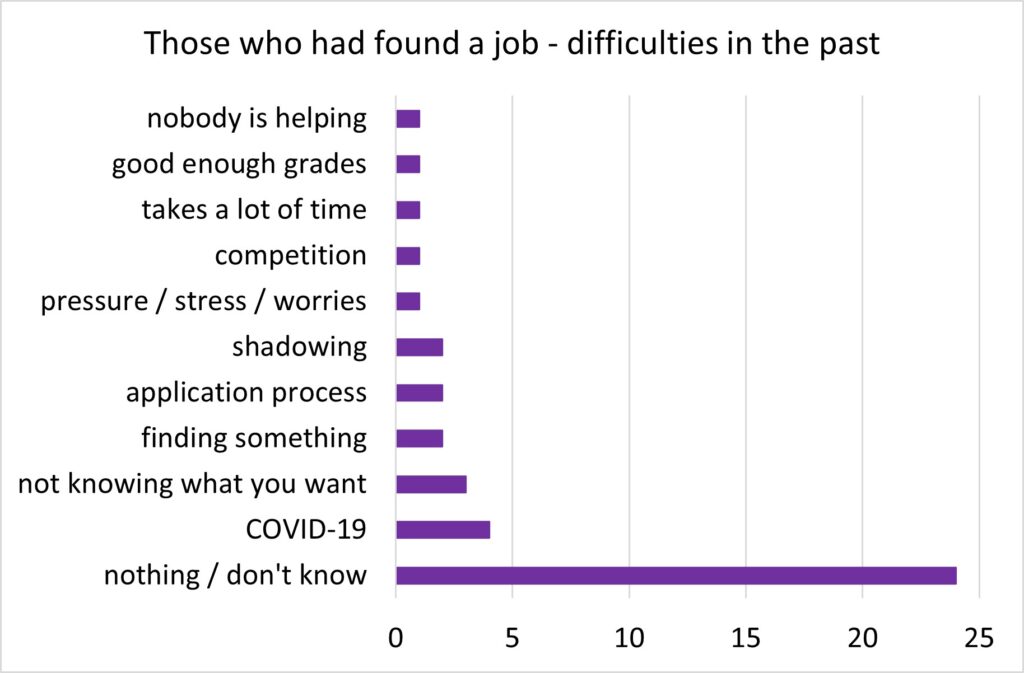
Note: the study participants’ answers were analyzed inductively through a thematic content analysis. The graph represents aggregated topics, and each participant could refer to as many topics as they wanted.
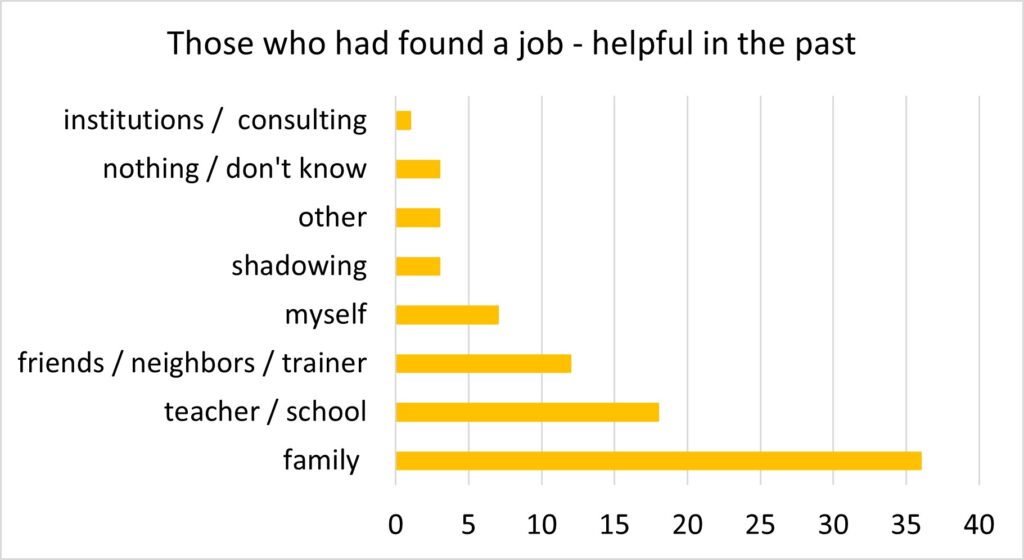
Note: the study participants’ answers were analyzed inductively through a thematic content analysis. The graph represents aggregated topics, and each participant could refer to as many topics as they wanted.
Participants Still Searching for Employment
Those 68% of the participants, who had not yet found a job or been accepted to pursue further education, were facing diverse difficulties. Many highlighted personal characteristics, like insecurities, motivation, school level, age, or ethnic heritage, as issues that they experienced. Furthermore, COVID-19 was also highlighted as a stress factor, particularly concerning its interference with shadowing, that is accompanying someone working in their profession for a day or a week.
Additionally, some noted being worried about having sufficient grades, the competition being better than themselves, and not knowing what field they wanted to work in. They found their families, teachers, and schools to be the most resourceful in helping with their application processes.
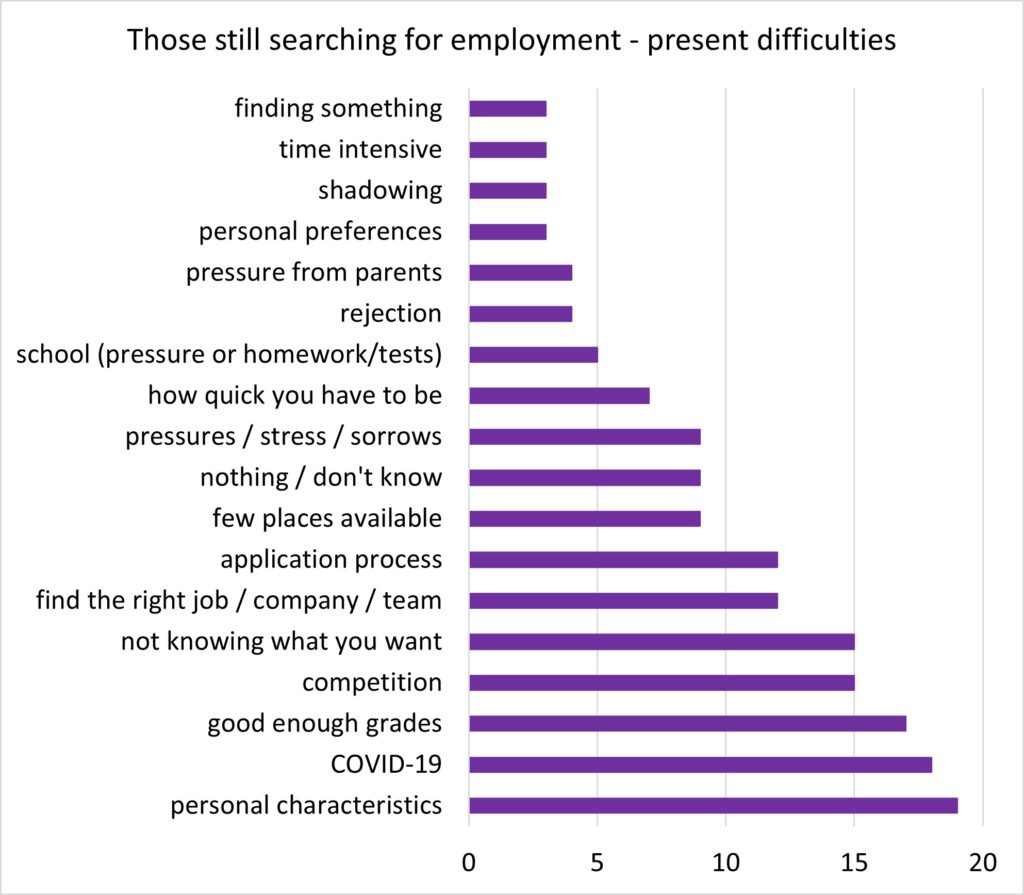
Note: the study participants’ answers were analyzed inductively through a thematic content analysis. The graph represents aggregated topics, and each participant could refer to as many topics as they wanted.
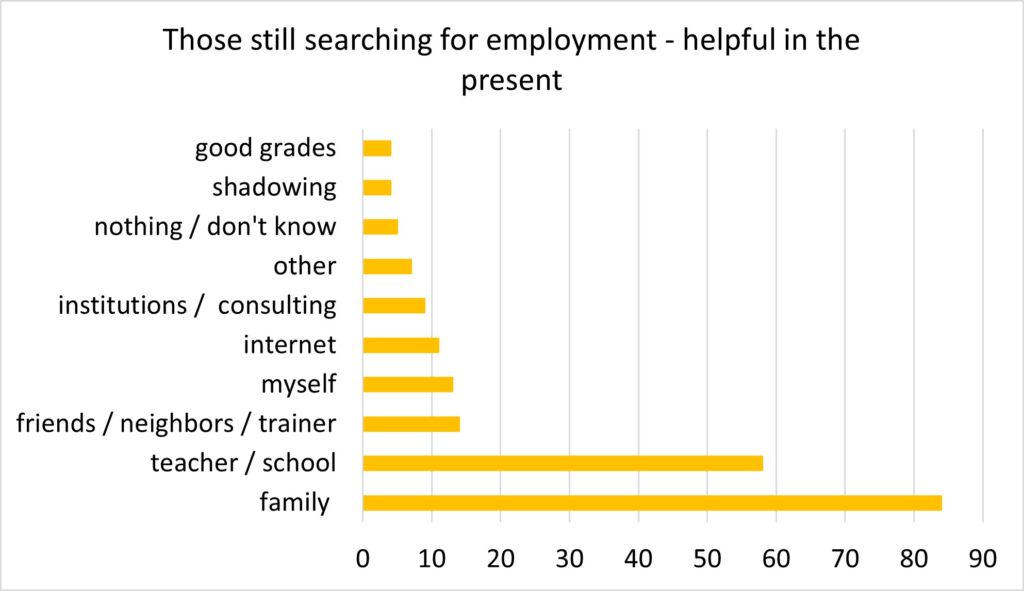
Note: the study participants’ answers were analyzed inductively through a thematic content analysis. The graph represents aggregated topics, and each participant could refer to as many topics as they wanted.
Thus, particularly those who had not yet found a job or obtained a position for further education found themselves facing various difficulties. However, both those who were already accepted and those who were not yet accepted found their social circles to be their best support system.
Resilience Seems to Help to Land a Job
To understand the supporting factors for the 32% of the participants who had already been accepted for a job or education, we compared them to those that had not yet been accepted. We found that adolescents born in Switzerland were slightly more likely to have found a job, than those that were born abroad.
Moreover, adolescents who understand Swiss-German very well were also more likely to have found a job than those who do not. However, the difference in both cases was not statistically significant. This means that we do not have statistical evidence that the difference between these groups would not be due to coincidence. Nevertheless, we found a significant positive correlation between resilience and the probability of having found a job.
This means that the higher a student rated their resilience, the higher the probability of them having found a job. Finally, we found an interaction between understanding Swiss-German and resilience. For adolescents with low resilience ratings, understanding Swiss-German very well seemed very important for finding a job or obtaining a position in higher education. Indeed, none of the students with a low resilience score (<3.79) who indicated that they did not understand Swiss-German very well had a job or study plan.
And while there is a positive correlation between resilience and job outcome for both (those who understand Swiss-German very well and those who do not), this connection is more important for those who do not. This means that the three resilience pillars, individual characteristics, and social and societal support are important for everyone, but particularly for those adolescents, who do not understand Swiss-German very well.
For adolescents with high resilience ratings, those who do not understand Swiss-German very well even overtake the others in terms of their estimated probability to find a job. Thus, resilience is an important factor when assessing factors that help adolescents with a migration background to overcome labor market disadvantages. Their individual characteristics and social support system combined with societal opportunities help them overcome inequalities in the labor market.
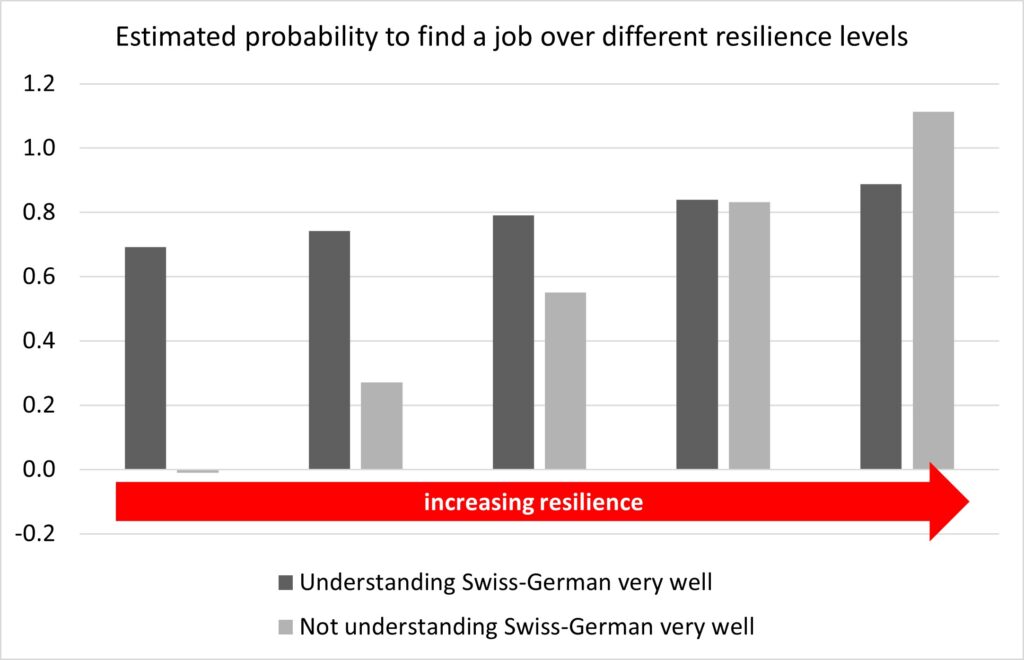
Note: the estimated probabilities are based on a small number of pupils in each group, leading to large confidence intervals for each of the estimated probabilities. Nevertheless, the overall relation between resilience and the probability of having career plans linked with understanding Swiss-German is statistically significant at a 95% level.
Petra Sidler is a doctoral candidate at the University of Neuchâtel and a fellow of the nccr – on the move and contributes to the project Overcoming Inequalities in the Labor Market: Can Educational Measures Strengthen the Agency and Resilience of Migrants, Refugees, and their Descendants.
Eva Van Belle – is an assistant professor at the Vrije Universiteit Brussel and a researcher in the nccr – on the move project ‘Overcoming Inequalities with Education.’ Her research focuses on labor market discrimination and policy evaluation.
References:
–Fibbi, R., Lerch, M., & Wanner, P. (2006). Unemployment and discrimination against youth of immigrant origin in Switzerland: When the name makes the difference. Journal of International Migration and Integration/Revue de l’integration et de la migration internationale, 7(3), 351-366.
–Fibbi, R., Ruedin, D., Stünzi, R., & Zschirnt, E. (2022). Hiring discrimination on the basis of skin colour? A correspondence test in Switzerland. Journal of Ethnic and Migration Studies, 48(7), 1515-1535.
–Janousch, C., Anyan, F., Kassis, W., Morote, R., Hjemdal, O., Sidler, P., Graf, U., Rietz, C., Chouvati, R., & Govaris, C. (2022). Resilience profiles across context: A latent profile analysis in a German, Greek, and Swiss sample of adolescents. PloS one, 17(1), e0263089.
–Masten, A. S. (2014). Ordinary magic. Resilience in development. New York, London: Guilford.
–Zschirnt, E. (2020). Evidence of hiring discrimination against the second generation: results from a correspondence test in the Swiss labour market. Journal of International Migration and Integration, 21(2), 563-585.
–Zschirnt, E., & Fibbi, R. (2019). Do Swiss citizens of immigrant origin face hiring discrimination in the labour market?. Université de Neuchâtel.


